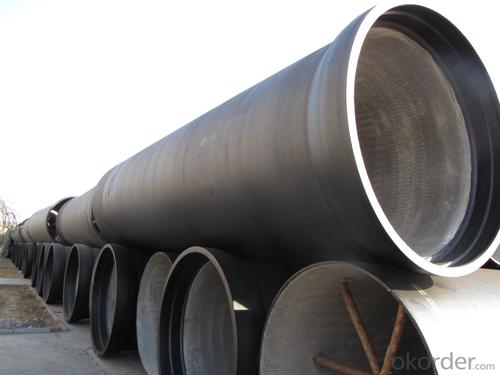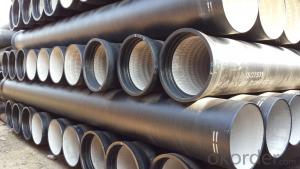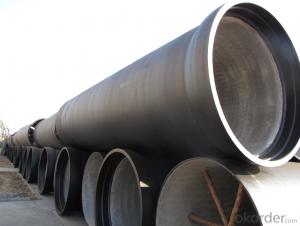Ductile Iron Pipe DN1600
OKorder Service Pledge
Quality Product, Order Online Tracking, Timely Delivery
OKorder Financial Service
Credit Rating, Credit Services, Credit Purchasing
You Might Also Like
Specifications
Quick Details
| Place of Origin: | China (Mainland) | Brand Name: | CMAX | Model Number: | T type / K type / Flange type |
| Length: | 6m / 5.7m / Negotiable | Standard: | ISO2531 / EN545 / EN598 | Application: | Potable / Sewage water |
| Diameter: | DN80~DN2200 | Shape: | Round | Hardness: | 230 |
| Pipe Wall Thickness: | standard | Pull Strength: | 420 | Yield (≥ MPa): | 300 |
| Material: | Ductile Iron | Type: | Centrifugal ductile cast iron pipe | Certification: | ISO2531 / EN545 / EN598 |
| Outer Diameter: | 80-2200 | Thickness: | standard | Specification: | DN80~DN2200 |
| |
The advantages to the customer:
Trustworthy financial strength.
One-stop shopping.
Fast and efficient service.
Coordination of shipments from multiple plants.
Specialists of the overseas shipping process.
A more competitive price.
- Q: Are ductile iron pipes suitable for use in irrigation gate systems?
- Yes, ductile iron pipes are suitable for use in irrigation gate systems. Ductile iron is a type of cast iron that has enhanced strength and flexibility, making it a durable and reliable choice for applications such as irrigation gate systems. Ductile iron pipes are known for their high tensile strength and resistance to corrosion, which is important for maintaining the integrity of the irrigation system. Additionally, ductile iron pipes have the ability to withstand high pressure and provide a long service life, making them a cost-effective solution for irrigation gate systems. Overall, ductile iron pipes are well-suited for use in irrigation gate systems due to their strength, durability, and resistance to corrosion.
- Q: Are ductile iron pipes suitable for high-temperature applications?
- High-temperature applications are generally not suitable for ductile iron pipes. Despite their strength and durability, ductile iron has limitations in high temperatures. Ductile iron pipes usually have a maximum operating temperature of around 250-300 degrees Fahrenheit (120-150 degrees Celsius). When subjected to higher temperatures, ductile iron pipes can undergo thermal expansion, potentially causing cracks or distortions. This can compromise the pipe's structural integrity, leading to leaks or failures. Additionally, ductile iron is vulnerable to oxidation at elevated temperatures, further deteriorating its performance over time. For high-temperature applications, it is generally advisable to opt for materials specifically designed for such conditions, like stainless steel or high-temperature alloys. These materials offer superior resistance against thermal expansion, oxidation, and other factors associated with high temperatures.
- Q: Can ductile iron pipes be used for geothermal systems?
- Indeed, geothermal systems can utilize ductile iron pipes. Renowned for their strength, durability, and resistance to corrosion, ductile iron pipes prove fitting for diverse applications, including geothermal systems. With the ability to withstand elevated temperatures and fluctuations in pressure, commonly encountered in geothermal systems, these pipes excel. Moreover, they possess exceptional thermal conductivity, facilitating efficient heat transfer between the geothermal fluid and the surrounding environment. Consequently, ductile iron pipes represent a feasible choice in transporting geothermal fluids within geothermal systems.
- Q: How do ductile iron pipes perform in extreme weather conditions?
- Ductile iron pipes are known for their exceptional performance in extreme weather conditions. These pipes, which are made from iron alloyed with small amounts of carbon and other elements, exhibit superior strength and resilience, making them highly resistant to the effects of extreme weather. In high temperatures, ductile iron pipes maintain their structural integrity and do not soften or deform like some other materials. This ensures that the pipes continue to function efficiently and reliably, even in scorching heat. Additionally, these pipes have a high resistance to thermal expansion, which minimizes the risk of pipe distortion or joint failure during temperature fluctuations. When it comes to extreme cold, ductile iron pipes also excel. They have a low coefficient of thermal expansion, which means they are less prone to cracking or fracturing due to freezing temperatures. Moreover, their robustness and flexibility allow them to withstand the pressure exerted by freezing water inside the pipes without significant damage. Furthermore, ductile iron pipes exhibit excellent corrosion resistance, whether it be from harsh chemicals, saltwater, or other corrosive substances that may be present in extreme weather conditions. This corrosion resistance ensures the longevity and reliability of the pipes, preventing leaks and maintaining water quality. In terms of durability, ductile iron pipes are designed to withstand heavy loads and external stresses. They have a high tensile strength, making them resistant to bending and breakage. This attribute is crucial in extreme weather conditions where heavy rainfall, strong winds, or even seismic activities may occur. Overall, ductile iron pipes have a proven track record of performing exceptionally well in extreme weather conditions. Their strength, resilience, thermal stability, corrosion resistance, and durability make them a reliable choice for various applications, such as water supply, sewage systems, and industrial pipelines, even in the harshest weather environments.
- Q: What is the difference between ductile iron pipes and cast iron pipes?
- Ductile iron pipes and cast iron pipes differ in terms of their composition and physical properties. Ductile iron pipes are made from ductile iron, which is a type of cast iron that contains nodular graphite in its microstructure, making it more flexible and resistant to cracking. On the other hand, cast iron pipes are made from gray cast iron, which has a gray, brittle structure due to the presence of graphite flakes. Ductile iron pipes are stronger, more durable, and less prone to damage, making them suitable for high-pressure applications and areas with heavy traffic loads. Cast iron pipes, although more brittle, are known for their corrosion resistance and are commonly used for water and sewage systems.
- Q: Does the cast iron pipe need separate corrosion protection?
- No, the inner and outer corrosion protection of the tube has been done.
- Q: What are the typical joint restraint requirements for ductile iron pipes under pressure?
- The typical joint restraint requirements for ductile iron pipes under pressure include the use of mechanical joint restraining devices such as bolts, gaskets, and thrust blocks. These restraints are necessary to prevent the pipes from separating or moving due to the internal pressure of the fluid being transported. Additionally, proper alignment and anchoring of the pipes are essential to ensure the integrity and stability of the pipeline system.
- Q: What is the expected bending stress capacity of ductile iron pipes?
- The expected bending stress capacity of ductile iron pipes can vary depending on various factors such as the pipe's diameter, wall thickness, and the specific grade of ductile iron used. However, generally speaking, ductile iron pipes have a high bending stress capacity compared to other pipe materials. Ductile iron pipes are known for their high tensile strength and flexibility, making them capable of withstanding significant bending stresses. The exact bending stress capacity can be determined through rigorous testing and analysis by considering factors like the pipe's mechanical properties, dimensions, and the maximum allowable deflection. It is important to note that the bending stress capacity of ductile iron pipes should be evaluated in accordance with industry standards and guidelines. These may include standards such as the American Water Works Association (AWWA) C150 or International Organization for Standardization (ISO) 2531, which provide specifications and testing methods for ductile iron pipes. Ultimately, the expected bending stress capacity of ductile iron pipes is determined by several factors and should be assessed based on the specific requirements of the application, considering industry standards and guidelines for accurate and reliable results.
- Q: Can ductile iron pipes be used for underground chemical transport systems?
- No, ductile iron pipes are not suitable for underground chemical transport systems as they are prone to corrosion and may react with certain chemicals, leading to potential leaks and contamination.
- Q: How much is the manual installation fee of ductile iron pipes from 100 to 150 per metre?
- DN150 ductile iron water supply pipe installation interface is not the same way, the installation of labor costs will be somewhat different
Send your message to us
Ductile Iron Pipe DN1600
OKorder Service Pledge
Quality Product, Order Online Tracking, Timely Delivery
OKorder Financial Service
Credit Rating, Credit Services, Credit Purchasing
Similar products
Hot products
Hot Searches
Related keywords























